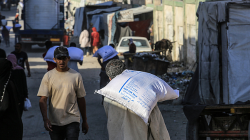UN Reports Gaza Humanitarian Crisis at Worst Level Since War Began
UN warns Gaza faces catastrophic crisis with worst conditions since October 2023 war begins

The humanitarian crisis in Gaza has reached unprecedented levels, with the United Nations declaring the situation the worst since the war erupted in October 2023. Months of intense airstrikes, widespread malnutrition, rampant displacement, and a breakdown in law and order have pushed the population to the brink, overwhelming the capacity of aid organizations and severely limiting access to vital supplies.
The UN Office for the Coordination of Humanitarian Affairs (OCHA) reported on Friday that only five truckloads of aid managed to enter the Gaza Strip on Thursday after a four-day halt. These trucks, loaded with desperately needed medical supplies for a field hospital in Deir Al-Balah, were among the few allowed passage through the embattled Kerem Shalom/Karem Abu Salem crossing. However, most of these supplies were tragically looted shortly after arrival, underscoring the total collapse of public order in certain areas. Another 60 trucks waiting at the crossing were forced to return due to ongoing violence and the presence of armed groups operating near the checkpoint.
Ongoing hostilities and a near-total blockade of supplies have created a dire scenario for Gaza’s 2.1 million residents. "Humanitarian needs have exploded," OCHA said, noting that the handful of trucks now sporadically entering the territory are insufficient to address the scale of the crisis. Aid agencies and the United Nations continue their efforts under extremely challenging conditions, facing severe movement restrictions and security risks that hamper the delivery of food, medicine, and shelter materials.
Health services in Gaza are also teetering on the edge of collapse. Officials confirmed that Al Awda Hospital, the last remaining partially-functioning medical facility, was forced to evacuate following repeated strikes in its vicinity. Recent attacks in Deir al-Balah and further south in camps such as Al Bureij and An Nuseirat have resulted in additional civilian casualties, including the reported deaths of nine members of a journalist’s family in a single incident.
International humanitarian workers have also suffered heavy losses. In the past two days alone, five staff from a major aid agency running community kitchens and nutrition centers were killed, and two others injured. The United Nations reiterated the imperative that civilians and aid workers must always be protected in conflict zones, calling for all parties to uphold international humanitarian law.
The scale of displacement remains staggering, with nearly 200,000 people forced from their homes in just the last two weeks. The latest Israeli-issued evacuation orders now cover approximately 30 percent of Gaza’s territory, including large parts of North Gaza, Gaza City, and Deir al-Balah. Many residents, however, are reportedly moving in search of food and other basics rather than in response to official orders, as supplies continue to dwindle.
Efforts to address the massive gap in shelter and basic needs persist. Aid partners recently began distributing emergency shelter kits to vulnerable families as part of pilot programs to pool available resources. Yet the deteriorating security situation has contributed to a spate of looting incidents. Armed groups stormed a warehouse in Deir al-Balah, taking medical equipment, essential medicines, and nutrition supplements intended for malnourished children. OCHA stressed the urgent need for both accountability for these crimes and immediate measures to restore law and order.
OCHA emphasized that Israel, as the occupying power, holds primary responsibility for restoring public safety and facilitating humanitarian access. The agency called for more aid and commercial goods to be allowed into Gaza via multiple crossings, alongside the deployment of law enforcement trained to protect civilians and prevent further criminal activity. "Criminal looting must be stopped decisively and through lawful means," the office stated, urging a full lifting of the blockade and action to address the root causes of Gaza’s deprivation.
Meanwhile, the crisis is not limited to Gaza. In the West Bank, the frequency of violence by Israeli settlers has surged, resulting in more than 220 Palestinian injuries this year—marking the highest rate in at least two decades. Entire communities have been forcibly displaced, including the Bedouin community of Maghayer ad Deir, which was uprooted following the establishment of a new settlement outpost.
Israeli-imposed movement restrictions also remain severe across the Salfit governorate, impacting roughly 90,000 Palestinians’ access to healthcare, education, and livelihoods. Extended military operations have led to the closure of key routes, forcing residents to endure lengthy detours, higher transportation costs, and significant disruptions to daily life. Humanitarian agencies continue to emphasize the necessity of safe, unimpeded access to critical services for all civilians amidst this escalating crisis.




